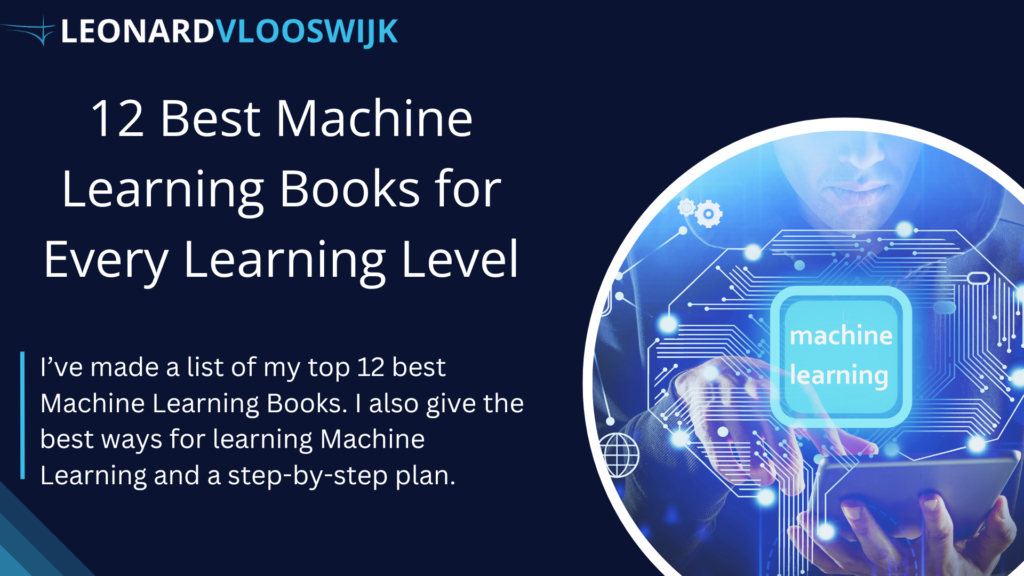Ready to explore the world of machine learning? It might seem overwhelming, but don’t worry –
I’ve put together an easy guide to the “Best Machine Learning Books” just for you.
Whether you’re starting from scratch or looking to level up your skills, these handpicked books are here to guide you.
From the basics to advanced topics and even a peek into artificial intelligence, these books are the next step on your learning journey.
Let’s start this adventure and uncover the valuable knowledge hidden in these best machine-learning books.
12 Best Machine Learning Books Overview
| Category | Book Title | Author | Topics Covered |
| Absolute Beginners | 1. Machine Learning for Absolute Beginners | Oliver Theobald | – Basics of Machine Learning |
| 2. Machine Learning for Dummies | John Paul Mueller | – Introduction to Machine Learning | |
| 3. Machine Learning for Beginners | Chris Sebastian | – Foundational Concepts of Machine Learning | |
| With Python | 4. Introduction to Machine Learning with Python | Andreas Müller | – Practical Applications with Python |
| 5. Machine Learning with Python | Oliver Theobald | – Python-based Machine Learning Techniques | |
| 6. Python Machine Learning | Sebastian Raschka | – Python-focused Machine Learning | |
| Advanced Learners | 7. Machine Learning: A Probabilistic Perspective | Kevin P. Murphy | – Probabilistic Machine Learning |
| 8. Reinforcement Learning, Second Edition: An Introduction | Richard S. Sutton | – Advanced Concepts in Reinforcement Learning | |
| 9. Probabilistic Machine Learning: Advanced Topics | Kevin P. Murphy | – Advanced Probabilistic Modeling | |
| With Artificial Intelligence (AI) | 10. Applied Artificial Intelligence: A Handbook for Business Leaders | Mariya Yao | – Practical AI Applications in Business |
| 11. AI and Machine Learning for Coders | Laurence Moroney | – Integration of AI into Coding | |
| 12. Artificial Intelligence for Humans | Jeff Heaton | – Overview of AI Concepts |
12 Best Machine Learning Books
I did my best to put a list together of the best machine learning books out there based on categories.
3 Best Machine Learning Books for Absolute Beginners
I’ve curated a list of the 3 Best Machine Learning Books for Absolute Beginners to kickstart your learning journey. Whether you’re new to the field or just looking to solidify your foundations, these books offer a fantastic starting point.
1. Machine Learning for Absolute Beginners by Oliver Theobald
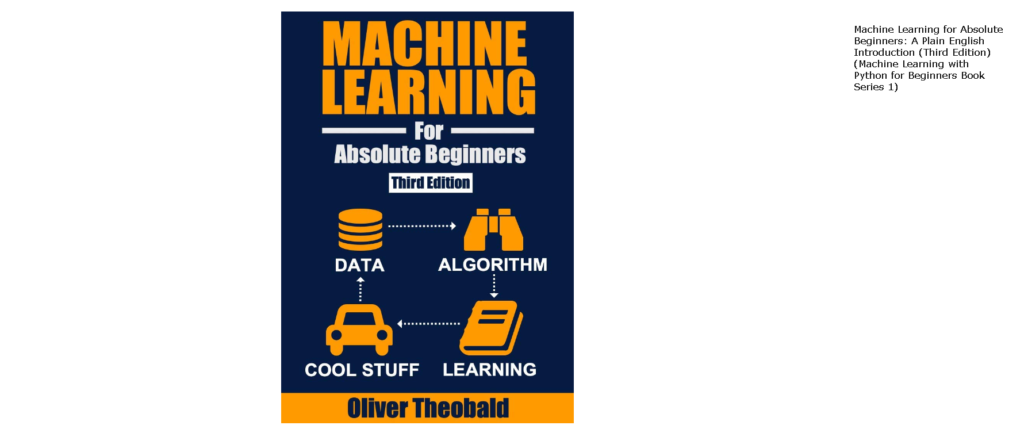
Oliver Theobald’s book is a clear and concise introduction to machine learning for absolute beginners. Covering supervised and unsupervised learning with practical examples, it stands out for its simplicity without compromising depth.
Topics Covered:
- Supervised and unsupervised learning
- Introduction to algorithms
- Model evaluation with hands-on examples and applications
Why Should You Read This Machine Learning Book?
If you’re brand new to machine learning, this book serves as an excellent entry point. The author provides a clear and concise explanation of concepts, making it accessible for beginners without sacrificing depth.
What I Like About This Book:
Personally, I appreciate the author’s commitment to simplicity without compromising on the core principles. The practical examples and step-by-step exercises make it an engaging and effective learning resource.
2. Machine Learning for Dummies by John Paul Mueller
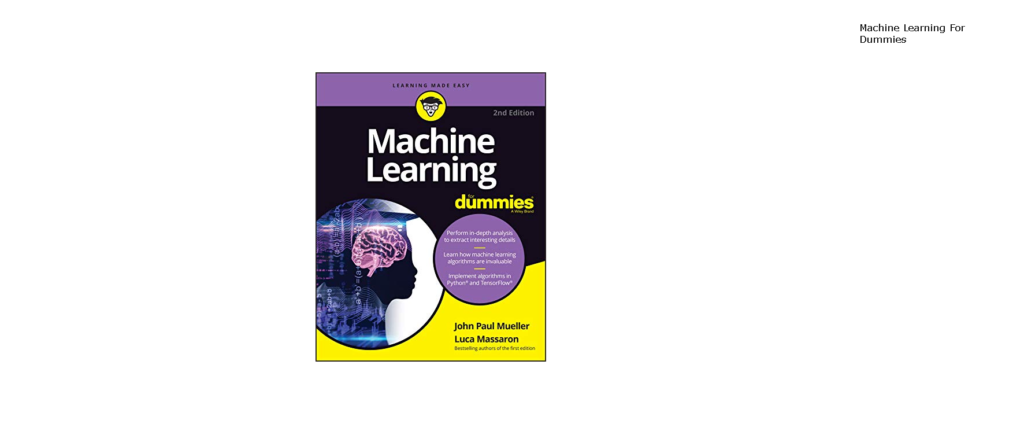
John Paul Mueller’s guide is a comprehensive resource for structured learning. Covering basics, algorithms, and model training, it demystifies complex concepts with clear organization and thorough explanations, making it ideal for beginners.
Topics Covered:
- Basics of machine learning
- Algorithms and data preprocessing
- Comprehensive coverage of model training
Why Should You Read This Machine Learning Book?
“Machine Learning for Dummies” is an ideal choice for beginners who prefer a structured and detailed approach. It’s designed to demystify complex concepts, making it easier for readers to grasp the intricacies of machine learning.
What I Like About This Book:
The book’s organization and clarity make it stand out. John Paul Mueller takes the time to explain each concept thoroughly, ensuring that readers have a solid understanding before moving on to more advanced topics.
3. Machine Learning for Beginners by Chris Sebastian
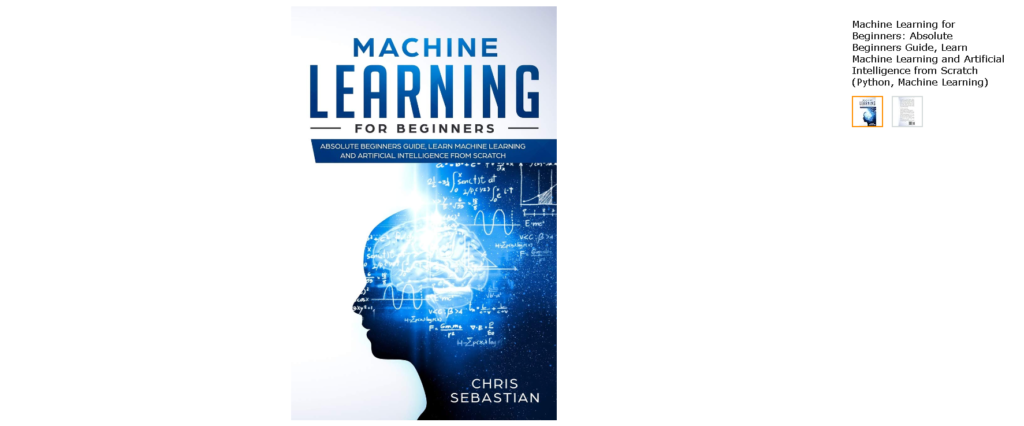
Chris Sebastian’s book offers a hands-on introduction to machine learning, emphasizing practical applications. Focused on real-world scenarios, it provides an interactive learning experience, making it an excellent choice for beginners.
Topics Covered:
- Hands-on introduction to machine learning
- Data preprocessing and model building
- Emphasis on practical applications
Why Should You Read This Machine Learning Book?
If you prefer a more interactive learning experience, “Machine Learning for Beginners” is an excellent choice. The author combines theory with practical examples, allowing readers to implement what they learn in real-world scenarios.
What I Like About This Book:
I find the book’s emphasis on practicality refreshing. Chris Sebastian’s approach ensures that readers not only understand the theory but also gain the skills needed to apply machine learning concepts in their own projects.
3 Best Machine Learning Books with Python
These are the 3 Best Machine Learning Books with Python. I picked these to guide you through the fascinating intersection of Python and machine learning.
1. Introduction to Machine Learning with Python by Andreas Müller
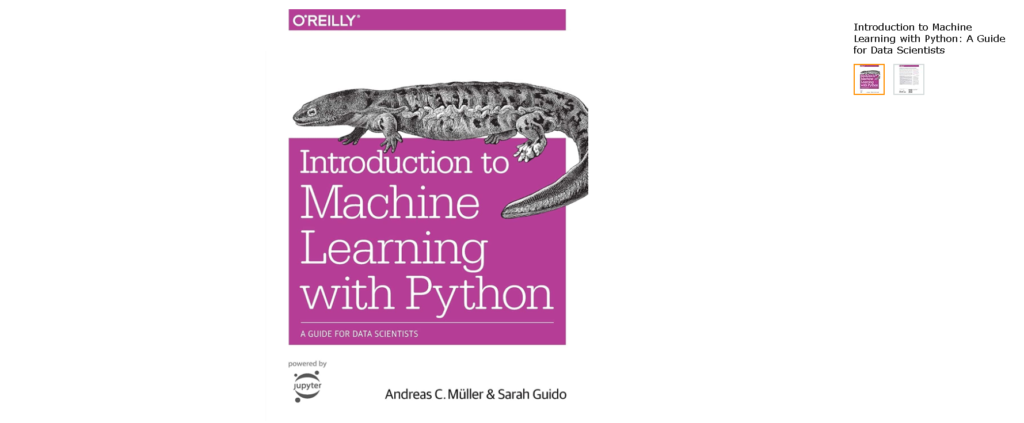
Andreas Müller’s book is a beginner-friendly gateway to machine learning using Python. It provides hands-on learning with practical examples and exercises, ensuring a solid understanding of key libraries and concepts.
Topics Covered:
- Fundamentals of machine learning using Python
- Practical introduction to key libraries like scikit-learn
- Hands-on examples and exercises for real-world application
Why Should You Read This Machine Learning Book?
This book is an excellent starting point for anyone looking to grasp the basics of machine learning with Python. Müller provides a practical and comprehensive introduction, making it accessible for beginners while ensuring depth in understanding.
What I Like About This Book:
I appreciate the author’s emphasis on hands-on learning. The inclusion of practical examples and exercises enhances the reader’s ability to apply machine learning concepts using Python effectively.
2. Machine Learning with Python by Oliver Theobald
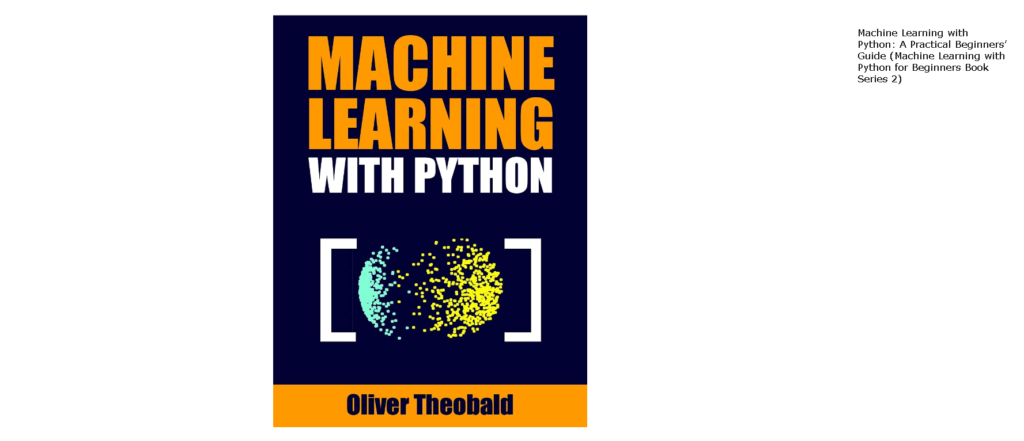
Oliver Theobald’s Python-centric guide explores key algorithms and practical applications in machine learning. With clear explanations and real-world case studies, it strikes a perfect balance between theory and practice for Python enthusiasts.
Topics Covered:
- Python-centric approach to machine learning
- In-depth coverage of key algorithms and techniques
- Practical applications and case studies for real-world scenarios
Why Should You Read This Machine Learning Book?
Oliver Theobald’s book is tailored for those who want a Python-centric exploration of machine learning. With a focus on algorithms and practical applications, it’s an ideal resource for individuals looking to apply Python in the context of machine learning.
What I Like About This Book:
The clear explanation of Python-centric machine learning concepts and the inclusion of real-world case studies make this book stand out. It strikes a balance between theory and practical application.
3. Python Machine Learning by Sebastian Raschka
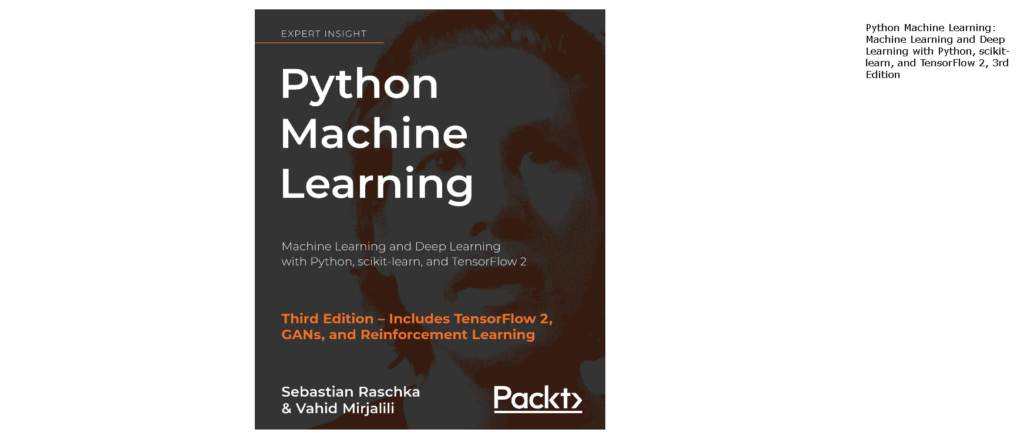
Sebastian Raschka’s book caters to both beginners and intermediate learners, covering basics to advanced topics like neural networks. Packed with hands-on examples and code snippets, it equips readers for practical implementation in real-world scenarios.
Topics Covered:
- Comprehensive coverage of machine learning using Python
- Deep dive into advanced topics like neural networks
- Hands-on examples and code snippets for practical implementation
Why Should You Read This Machine Learning Book?
Sebastian Raschka’s book is a go-to guide for those seeking a thorough understanding of machine learning with Python. It covers a wide range of topics, from the basics to advanced concepts, making it suitable for both beginners and intermediate learners.
What I Like About This Book:
The depth of coverage on advanced topics is commendable. Raschka’s inclusion of hands-on examples and code snippets makes complex concepts more accessible and facilitates practical implementation.
3 Best Machine Learning Books for Advanced Learners
Explore my top picks for the 3 Best Machine Learning Books for Advanced Learners, each offering a profound understanding of complex concepts and pushing the boundaries of your machine learning expertise.
1. Machine Learning: A Probabilistic Perspective by Kevin P. Murphy
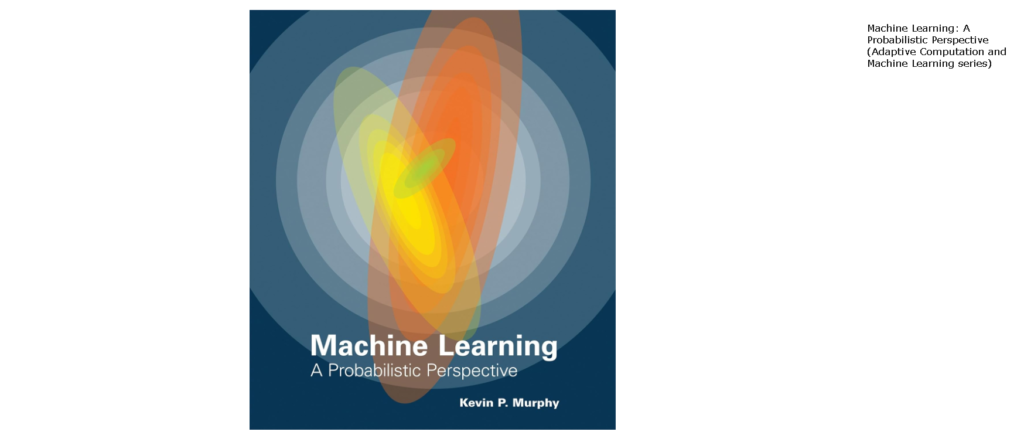
Kevin P. Murphy’s book delves into probabilistic machine learning, offering advanced learners a comprehensive exploration of models, Bayesian networks, and advanced topics. Murphy’s clarity makes complex concepts accessible, making it an invaluable reference for those advancing their machine learning expertise.
Topics Covered:
- Probabilistic models and reasoning
- Bayesian networks and graphical models
- Advanced topics in probabilistic machine learning
Why Should You Read This Machine Learning Book?
If you’re ready to delve into the intricacies of probabilistic machine learning, Kevin P. Murphy’s book is a must-read. It offers a comprehensive exploration of probabilistic models, Bayesian networks, and advanced topics that will deepen your understanding and elevate your expertise.
What I Like About This Book:
I appreciate Murphy’s ability to convey complex concepts in a clear and concise manner. The book not only challenges advanced learners but also serves as a valuable reference with its in-depth coverage of probabilistic machine learning.
2. Reinforcement Learning, Second Edition: An Introduction by Richard S. Sutton
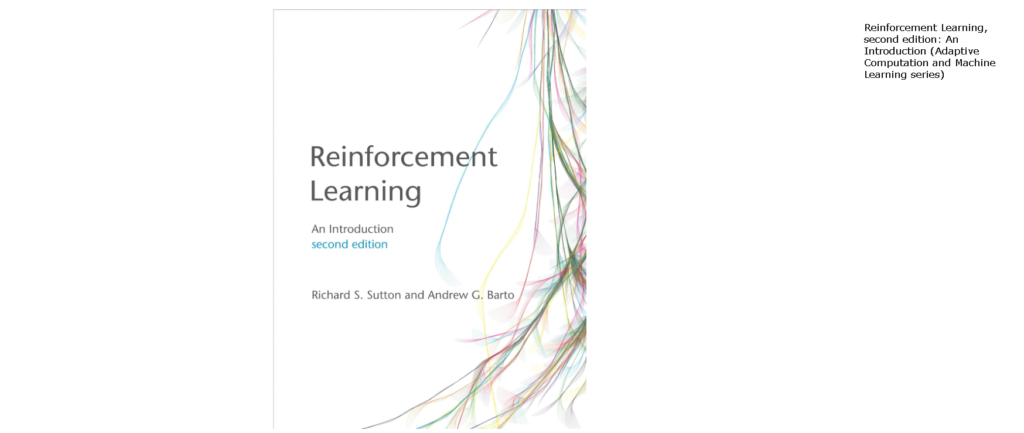
Richard S. Sutton’s second edition is an essential read for advanced learners in reinforcement learning. Covering foundational and advanced techniques with clarity and real-world examples, it’s a comprehensive guide for mastering reinforcement learning.
Topics Covered:
- Foundations of reinforcement learning
- Temporal difference learning
- Deep reinforcement learning
Why Should You Read This Machine Learning Book?
Richard S. Sutton’s book is a comprehensive guide to reinforcement learning, diving into foundational concepts and advanced techniques like temporal difference learning and deep reinforcement learning. If you seek mastery in reinforcement learning, this book is your roadmap.
What I Like About This Book:
Sutton’s book stands out for its clarity in explaining complex reinforcement learning algorithms. The inclusion of real-world examples and applications enhances the practical understanding of advanced concepts.
3. Probabilistic Machine Learning: Advanced Topics by Kevin P. Murphy
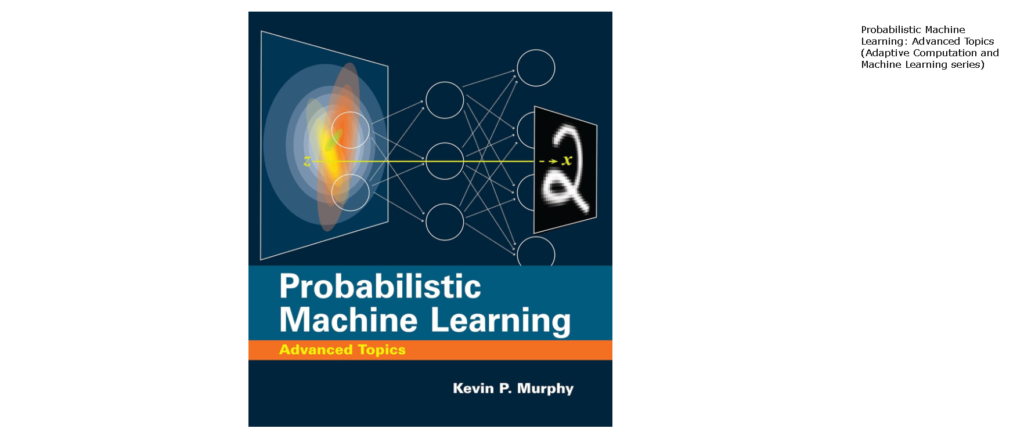
Kevin P. Murphy’s book takes advanced learners on an insightful journey into advanced probabilistic machine learning. Exploring topics like Bayesian non-parametrics and hierarchical models, it equips learners with the tools needed for navigating complex probabilistic concepts.
Topics Covered:
- Advanced probabilistic modeling
- Bayesian non-parametrics
- Hierarchical models and advanced topics
Why Should You Read This Machine Learning Book?
Kevin P. Murphy’s advanced guide to probabilistic machine learning takes your knowledge to new heights. It explores advanced probabilistic modeling, Bayesian non-parametrics, and hierarchical models, providing a comprehensive resource for those seeking a deeper understanding.
What I Like About This Book:
Murphy’s meticulous approach to advanced topics makes this book an invaluable resource. It not only challenges advanced learners but also equips them with the tools needed to navigate the complexities of probabilistic machine learning.
3 Best Machine Learning Books With Artificial Intelligence (AI)
These are my top picks for the 3 Best Machine Learning Books With Artificial Intelligence. These books are curated to provide valuable insights into the symbiotic relationship between machine learning and AI, offering both business leaders and coding enthusiasts a holistic understanding.
1. Applied Artificial Intelligence: A Handbook for Business Leaders by Mariya Yao
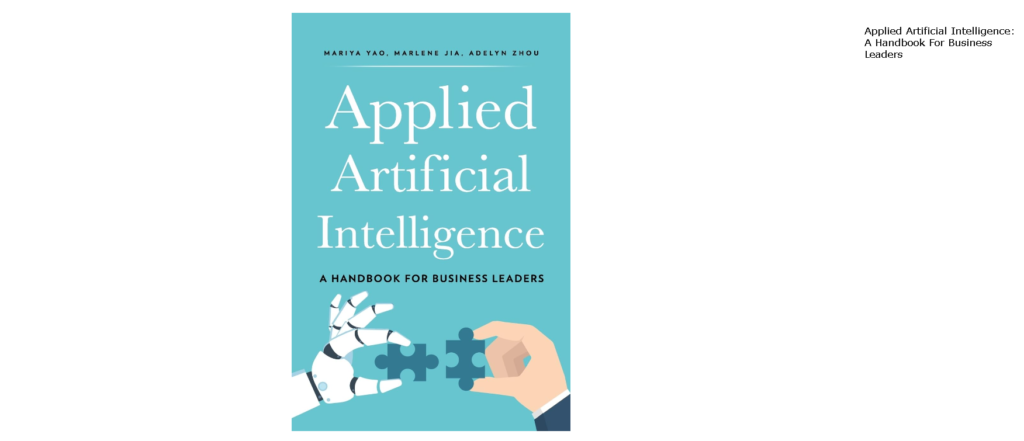
Mariya Yao’s book is a practical guide for business leaders, offering actionable insights into AI integration with real-world case studies. It stands out for transforming complex AI concepts into strategic applications for effective business implementation.
Topics Covered:
- Practical applications of AI in business
- Strategies for integrating AI into existing workflows
- Case studies and real-world examples
Why Should You Read This Machine Learning Book?
For business leaders seeking a practical guide to harnessing AI’s power, Mariya Yao’s book is indispensable. It provides actionable insights into implementing AI strategies, making it a valuable resource for those navigating the evolving landscape of AI in business.
What I Like About This Book:
Mariya Yao’s ability to distill complex AI concepts into practical strategies is commendable. The inclusion of real-world case studies adds a layer of applicability, making this book a go-to resource for business leaders aiming to leverage AI effectively.
2. AI and Machine Learning for Coders by Laurence Moroney
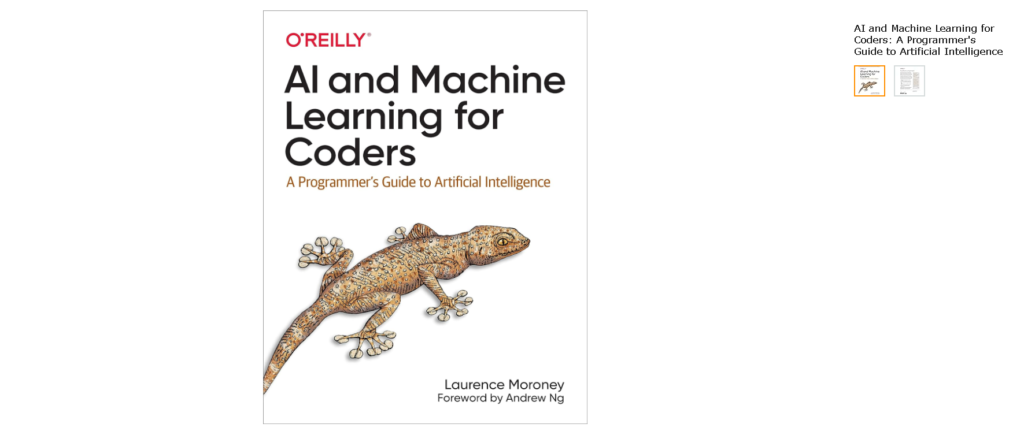
Laurence Moroney’s book is tailored for coding enthusiasts, providing a hands-on approach to AI and machine learning. With a focus on fundamentals and practical coding exercises, Moroney bridges the gap between theory and application, making it a valuable resource for developers.
Topics Covered:
- Fundamentals of AI and machine learning for coding
- Hands-on coding exercises and projects
- Integration of AI into software development
Why Should You Read This Machine Learning Book?
Laurence Moroney’s book is tailor-made for coders looking to delve into AI and machine learning. It provides a solid foundation in the fundamentals, accompanied by practical coding exercises. This makes it an excellent choice for developers aiming to integrate AI seamlessly into their projects.
What I Like About This Book:
The hands-on approach, with a focus on coding exercises and projects, sets Moroney’s book apart. It’s an engaging resource that bridges the gap between AI theory and practical application for coding enthusiasts.
3. Artificial Intelligence for Humans by Jeff Heaton
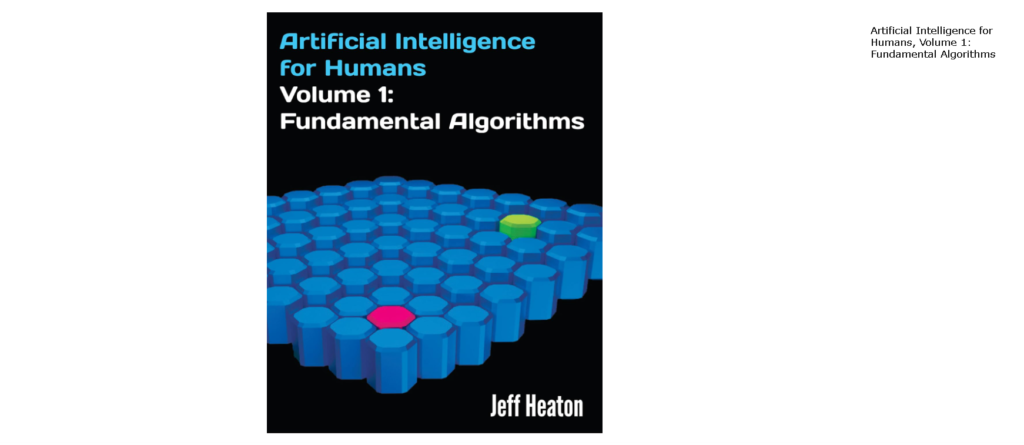
Jeff Heaton’s comprehensive guide offers a well-rounded understanding of AI, covering fundamentals, practical applications, and ethical considerations. It prompts readers to reflect on responsible AI development, making it a valuable resource for those interested in the human aspects of artificial intelligence.
Topics Covered:
- Overview of AI concepts and algorithms
- Practical applications of AI in everyday life
- Ethical considerations in AI development
Why Should You Read This Machine Learning Book?
Jeff Heaton’s book is a comprehensive guide for those curious about AI’s broader implications. It covers both the fundamentals and practical applications, making it suitable for individuals wanting a holistic understanding of AI beyond coding or business perspectives.
What I Like About This Book:
Heaton’s inclusion of ethical considerations adds a crucial dimension to the book. It prompts readers to reflect on the responsible development and deployment of AI, making it a well-rounded resource for those interested in the human aspects of artificial intelligence.
How Do You Start with Machine Learning?
Starting with machine learning can seem a bit overwhelming, but it’s actually quite doable if you take it step by step. Here’s a simple guide to help you get started:
1. Get the Basics:
Start by understanding the basic ideas behind machine learning. Learn about things like supervised learning, unsupervised learning, algorithms, and how models are evaluated. There are lots of online tutorials and courses that can help you with this.
2. Learn a Language:
Python is a great language for machine learning. Take some time to learn the basics of Python and how to use libraries like NumPy and Pandas for working with data.
3. Try Machine Learning Libraries:
Experiment with machine learning libraries. Begin with simpler models and work your way up. Scikit-learn is a good starting point as it has many algorithms for different tasks.
4. Take Online Classes:
Sign up for online classes made for beginners in machine learning. Websites like Coursera, edX, and Udacity have courses by experts (see my Coursera vs Udacity article). Andrew Ng’s “Machine Learning” on Coursera is highly recommended.
5. Work on Real Projects:
Apply what you’ve learned by working on real projects. Pick a subject you like, whether it’s health, finance, or games, and start creating models to solve practical problems. This hands-on experience is really helpful.
6. Explore Special Areas:
Machine learning has different areas like language processing, computer vision, and reinforcement learning. Once you feel comfortable, explore these areas to find what you enjoy the most.
7. Stay Updated:
Keep up with what’s happening in the field. Follow blogs, read research papers, and keep an eye on conferences. Join online communities to connect with others learning machine learning.
8. Join Kaggle Competitions:
Kaggle is a fun platform where you can take part in machine learning competitions. It’s a great way to practice and learn from others.
9. Keep Learning and Trying:
Machine learning is always changing, so keep learning and trying new things. Experiment with different algorithms and techniques. Building a collection of projects can show off your skills to others.
Remember, learning machine learning is a journey, not a race. Take your time, enjoy the process, and don’t be afraid to ask for help when you need it.
Best Ways to Learn Machine Learning
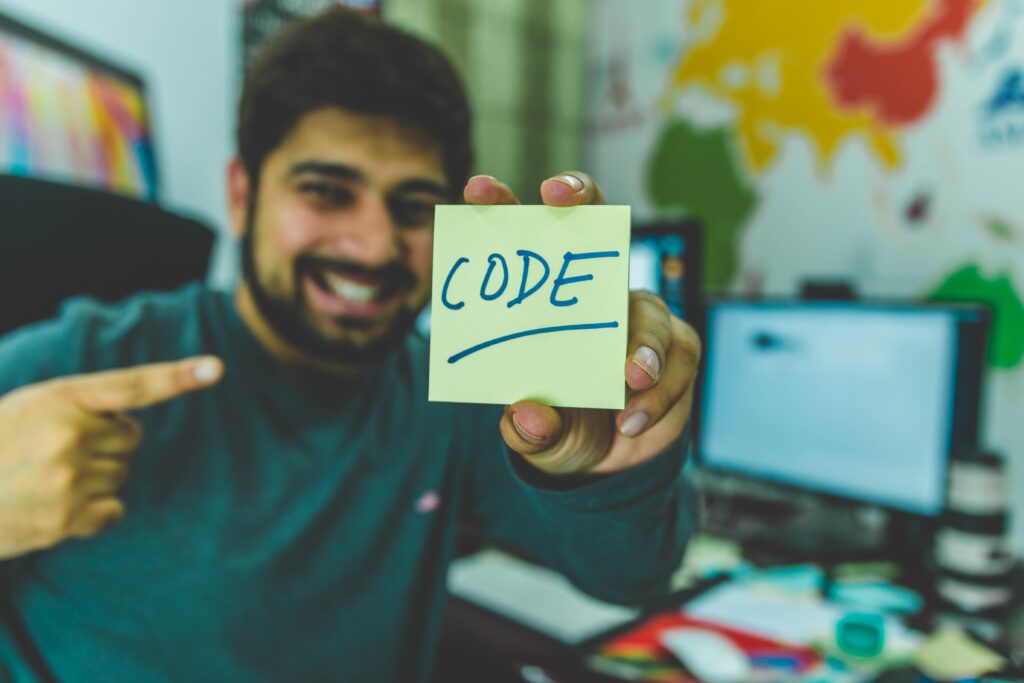
Learning machine learning can be a rewarding journey, but with the multitude of resources available, finding the best way to begin can be challenging. Here are some effective and straightforward methods to learn machine learning:
1. Online Courses and Tutorials:
Explore online courses and tutorials specifically designed for beginners. Platforms like Coursera, Datacamp, and Khan Academy offer structured lessons on machine learning fundamentals, taught by industry experts. Check my list of Best Course Platforms!
2. Interactive Learning Platforms:
Utilize interactive learning platforms like Codecademy and FreeCodeCamp (See my Codecademy vs FreeCodeCamp article), which provide hands-on exercises and projects. These platforms offer a practical approach to understanding machine learning concepts and applying them in real-world scenarios.
3. Books and Documentation:
Refer to well-regarded books on machine learning for in-depth understanding. Books such as “Hands-On Machine Learning with Scikit-Learn, Keras, and TensorFlow” by Aurélien Géron and “Pattern Recognition and Machine Learning” by Christopher M. Bishop are excellent resources. Additionally, explore official documentation of popular libraries like scikit-learn and TensorFlow.
4. Join Online Communities:
Engage with the machine learning community through platforms like Stack Overflow, Reddit, and GitHub. Participating in discussions, asking questions, and collaborating on projects can provide valuable insights and guidance.
5. Kaggle Competitions:
Participate in Kaggle competitions to apply your knowledge in a competitive environment. Kaggle offers real-world datasets and challenging problems, allowing you to test your skills and learn from the approaches of other data enthusiasts.
6. Project-Based Learning:
Undertake project-based learning by working on machine learning projects. Choose projects aligned with your interests, whether it’s predicting stock prices, image recognition, or natural language processing. Practical application enhances understanding and retention of concepts.
7. University Courses and Degrees:
Enroll in university courses or pursue a degree in machine learning. Institutions like Stanford University and Massachusetts Institute of Technology (MIT) offer comprehensive courses, often available online. Formal education can provide a structured and in-depth learning experience.
8. Meetups and Conferences:
Attend machine learning meetups, conferences, and workshops to network with professionals and stay updated on industry trends. Events like the International Conference on Machine Learning (ICML) and NeurIPS offer opportunities to learn from experts and connect with the community.
9. Specialization Courses:
Explore specialization courses in specific areas of machine learning, such as natural language processing, computer vision, or reinforcement learning. Platforms like Coursera offer specialized tracks that allow you to deepen your expertise in a particular field.
Remember, the best way to learn machine learning may vary from person to person. It’s often beneficial to combine multiple methods for a well-rounded and comprehensive learning experience.
Wrap Up
And that’s a wrap on our journey through the best books for machine learning. Each book we’ve covered, whether you’re starting out or diving into advanced concepts, is like a guide for your learning.
If you’re a business leader, Mariya Yao’s book has practical insights. Laurence Moroney’s work is hands-on for coders, and Jeff Heaton’s approach is holistic, touching on ethics.
Learning is ongoing. The paths we discussed – online courses, projects, and community engagement – offer different ways to learn. Machine learning is more than just algorithms; it’s a world of curiosity, practice, and collaboration.
Whether you’re a beginner or aiming for mastery, these books, combined with online courses and real projects, form a toolkit for your learning adventure. So, dive into the knowledge, untangle the complexities, and apply what you’ve learned.
The world of machine learning is ready for your exploration, and with these books as your companions, you’re well-prepared for the exciting journey of innovation and discovery.
Frequently Asked Questions (FAQ)
1. I’m completely new to machine learning. Where should I start?
If you’re a beginner, consider starting with books like “Machine Learning for Absolute Beginners” by Oliver Theobald or enrolling in introductory online courses. Building a strong foundation in the basics is key.
2. Are these books suitable for self-learning, or do I need a background in programming?
Many of these best machine learning books cater to self-learners, offering a gradual introduction to programming and machine learning concepts. However, having a basic understanding of programming, especially in languages like Python, can be beneficial. (Check my best Udemy Python courses article)
3. How can I apply what I learn from these best machine learning books in real-world projects?
To apply your knowledge, consider working on real-world projects related to your interests. Platforms like Kaggle offer datasets and challenges to help you practice and apply machine learning concepts in practical scenarios.
4. Can I learn machine learning without a formal education in computer science?
Absolutely! Many resources, including the recommended best machine learning books, are designed for individuals without a formal computer science background. Practical experience and project-based learning can be just as valuable as formal education.
5. What are some additional resources to combine these best machine learning books with?
Alongside these best machine learning books, consider exploring online courses on platforms like Coursera and edX, engaging with coding communities on platforms like GitHub, and participating in machine learning meetups or conferences for networking and staying updated on industry trends.
6. How often should I practice or engage with machine learning concepts to make progress?
Consistency is key. Aim to dedicate regular, focused time to practice coding, work on projects, and engage with the community. Regular practice helps reinforce concepts and keeps you updated on emerging trends in the field.
7. Are there any prerequisites for the advanced best machine learning books?
Yes, advanced books may assume a certain level of familiarity with machine learning concepts. It’s recommended to have a solid understanding of the basics and intermediate-level machine learning before delving into advanced topics.

